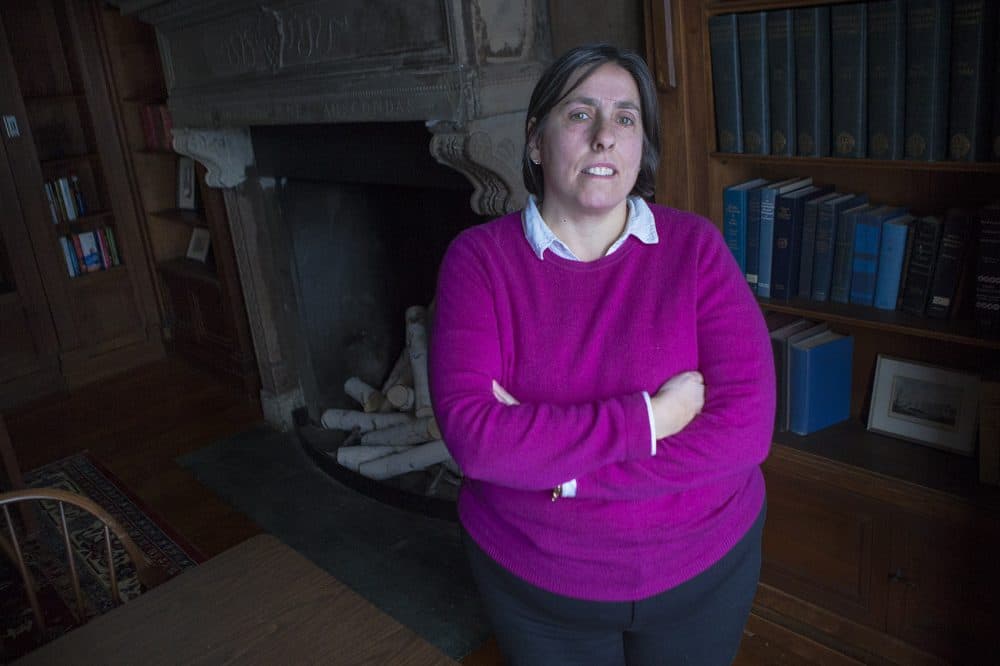Advertisement
This Moment In Cancer
Not All Cancer Kills: Researchers Study Active Surveillance For 'Stage Zero Breast Cancer'
Resume
Cassandra Xanthos, a school psychologist, wasn’t too worried when she got called back for a second mammogram last summer. She even remained calm when her doctor diagnosed her with ductal carcinoma in situ, often called breast cancer stage zero -- on a scale of 1-4. She went right ahead with her planned summer vacation.
But she admits to spending a few warm nights Googling her condition, to make sure her confidence wasn’t misplaced.
“I read a few things about it and sort of understood it as a -- not even so much as a precursor but as a marker for ‘you could possibly in the future get cancer,’ ” she said. “I guess we could all in the future get cancer.”
Ductal carcinoma in situ, or DCIS, is a cluster of abnormal cells inside a milk duct. But although those cells haven’t started growing --so they don’t meet the definition of cancer -- DCIS is still usually treated with surgery, radiation and years of hormone therapy. In 2018, the American Cancer Society estimates that there will be 269,000 new cases of breast cancer, plus 64,000 diagnoses of DCIS.
The problem is, doctors can’t tell for sure whose abnormal cells will sit around doing nothing forever, and whose will turn invasive. So they treat everyone with DCIS as if they had breast cancer.
Prostate cancer has long been the “poster child” for cancer over-treatment. Studies of male car crash victims show that the majority of older men have some cancerous cells in their prostates -- cells that never caused them any problems.
Now, researchers are also realizing that many early stage breast cancers picked up by mammograms, and thyroid cancers discovered largely by accident, may never turn dangerous.
“Not all cancer is deadly, for sure,” said Dr. Ann Partridge, an oncologist at the Dana-Farber Cancer Institute. “In fact, in the area I work -- breast cancer -- the vast majority of women will live through and beyond their disease long-term.”
Partridge is helping to lead a national study known as the COMET trial. The trial is looking at whether some women with seemingly low-risk DCIS can safely trade traditional treatment -- at least in the short term -- for so-called active surveillance, which includes regular mammograms to track the cells and ensure they aren’t spreading beyond the duct.
Any treatment is too much for patients who don’t need it, Partridge says. Radiation and chemotherapy -- which she called “well-intentioned poison” -- can cause terrible side effects and increase someone’s risk of other health problems later on.
“We're trying to get it right for each individual patient -- to get rid of the cancer and at the same time ... not have our treatments be worse than the disease,” Partridge said. “If we can spare people chemotherapy and the associated side effects both in the short and the long term that’s a win-win, especially if ultimately they all do just as well as they would have done had they gotten chemotherapy, without the side effects.”
Often, scientists can tell by looking at a cancer under a microscope whether it’s likely to be aggressive or relatively slow-growing. But there’s no way to know with perfect certainty, so choosing active surveillance will always be a little bit risky, says Dr. Michael Barry, the director of the Informed Medical Decisions Program at Massachusetts General Hospital.
Patients have to weigh their own preferences, anxieties and tolerance for risk, as well as the doctor’s best guess about how aggressive their tumor is likely to be.
“Doctors can’t make those decisions for people -- how they feel about outcomes is a key part of the decision-making process,” Barry said. “Clinicians and patients can decide together better than either can decide alone.”
Some people simply aren’t comfortable leaving tumors alone, even if science tells them the growth is harmless, said Dr. Otis Brawley, chief medical and scientific officer of the American Cancer Society.
A decade ago, virtually every American man diagnosed with localized prostate cancer was treated aggressively, Brawley said. “Today, well over half are being observed, and most of those that are being observed will never be treated in the man's natural lifetime.”
Partridge expects to see the same transformation in breast cancer treatment. She hopes that trials like COMET -- along with improvements in screening and better tools for deciding which cancers are most dangerous -- will help make it easier for doctors and patients to choose active surveillance.
Xanthos, 49, of Roslindale, wanted to be on the vanguard of that movement when she signed up for the COMET trial last summer. She really wanted to avoid aggressive treatment, but felt conflicted about it.
“I sort of didn’t want surgery but then felt it was too complicated to make all these decisions,” she says from her office at the Dexter Southfield School in Brookline, as children troop by on their way to class. “There was comfort around being in a trial as opposed to going it alone.”
She was disappointed to end up in the arm of the trial that required her to have surgery, rather than in the active surveillance group. But she got the procedure done quickly before the start of school in the fall, and it wasn’t nearly as bad as she feared. She skipped radiation and recently began hormone therapy. So far, she hasn’t seen any side effects, and is confident her brush with cancer is over.
“If I can just remember to take a pill every day for five years, I’ll be OK,” she says.
This segment aired on January 9, 2018.
